The Checker Maven
The World's Most Widely Read Checkers and Draughts Publication
Bob Newell, Editor-in-Chief
Published every Saturday morning in Honolulu, Hawai`i
Noticing missing images? An explanation is here.
Time Flies

November Speed Problem (medium difficulty)
[Read More]Black to Move and Crown

Here's one that's a little different, and although out of the mainstream of checker problems, we think you'll find it an interesting exercise in visualization. Here's the situation:
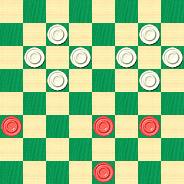
BLACK
Black to Move and Crown
For this puzzle, in which play adheres to the normal rules of checkers, Black is to crown a man while White is to prevent the attempt. Can you guide a Black man to the ranks of royalty? When you're done, click on Read More to see if your solution is truly noble.![]()
The Double Steal
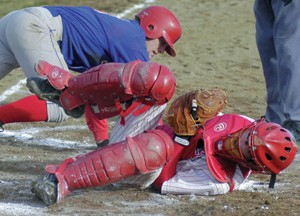
As we write this article, the 2005 World Series of baseball has begun, although when you read it, the title may already have been decided. Did the Astros complete their "Double Steal" and go all the way?
Regardless of the answer to that question, though, we invite you to "go all the way" to the solution of today's feature problem, a "double steal" theme by Tom Wiswell. You're sure to have an easier time of it than the Cards had with the Astros!
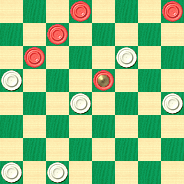
WHITE
White to Play and Win
White is a man up, but Black is going to even the score on his next move. Still, there is a way for White to recover the win.
Keep your eye on the ball, work out the answer, and then click on Read More when you've reached home plate in your solving.![]()
Checker School: Coming From Behind, Part 1

It's happened to any checkerist who has ever played beyond the starting position. We've gone a man down and we're looking for a way to at least save the draw. In the next few articles in our Checker School series, we'll have a look at some classic man-down draw positions. Now, depending on where you are in your checker career, this may be new material or just review. But either way, we're certain that knowledge of these positions will pull you out of many a predicament.
This month we'll start with a position attributed to A. Sinclair. Our solution and commentary is from Boland's classic work, Famous Positions in the Game of Checkers.
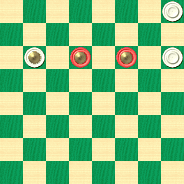
BLACK
Black to Play and Draw
Black is a man down, but he has two kings, to White's one, and the two White men are jammed on the single-corner side of the board. So Black might have a chance to rescue the situation.... but how?
Try this one out, and then click on Read More to nail down the technique.![]()
A Bit of a Break --- for Coffee and Cake?

We'll give you a bit of a break with this month's easier stroke problem --- or will we?
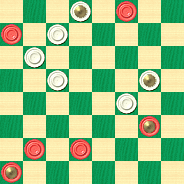
WHITE
White to Play and Win
You be the judge. Try out this puzzler, decide for yourself whether or not we've been easy on you, click on Read More to verify your solution, and then give yourself a break. We recommend that most delectable staple of checkerdom, coffee and cake.![]()
Another Two Not So Easy Pieces
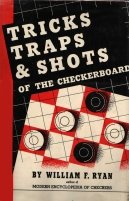
BLACK
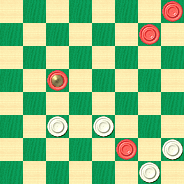
WHITE
White to Play and Win
'Ordinarily,white's cause in Example 15 would be hopeless. With the pieces even, and black's king on square 14 in a powerful center-of-the-board position, and the black piece on square 27 about to be crowned, further play seems to be futile. Despite all these symptoms of distress, white can engineer a flashy cul-de-sac in four of his own moves by resort to a "hook-up triple" or "aligned triple take." Alignment is the chief implement of all stroke and shot play. It means using ideas to force pieces onto certain squares by squeezing or pitching, so as to align (place) several pieces in position for successive capture. Can you force a triple take in Example 15? That's all there is to it!
BLACK
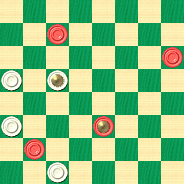
WHITE
White to Play and Win
Nothing so delights the beginner as a sweeping coup in which a number of pieces are swept from the board in one series of jumps. A casual glance at Example 16 does not impart the slightest suggestion of an impending coup, but nevertheless a "delayed long range triple" is in the offing. The white king on square 14, with the help of the piece on 21, makes a few well-forced preliminary moves and then, presto! the game is suddently climaxed with a ripping three-for-one shot, using what is known as a "throwback" technique. This give-away hint should enable rookie readers to develop some crafty ideas on how to handle the white pieces to make a win.'![]()
Brian's Twin


Well, there is really only one Brian Hinkle, but frankly, we're grateful for that much, as Brian has been a stalwart supporter and contributor to the work of The Checker Maven, as well as a top player and reknowned analyst and problem composer in his own right.
A Twin is a problem that has the same outcome no matter whose turn it is to move, and Brian kindly provided us with this sparkling example, which is a creation of his own.
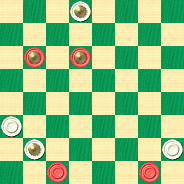
BLACK
Either to Move, Black Wins
Can you solve both parts of this twin, and determine the winning moves whether White or Black goes first? If so, you're likely to agree with Al Darrow, who called it the finest twin he had ever seen.![]()
Will The Real Doogz Please Stand Up?

Lest you be mistaken, this isn't the Doogz to whom we refer, and today's problem has nothing to do with that new British genre of music known as grime, nor are we concerned with the London grime musician formerly known as Doogz, and who now calls himself Durrty Goodz.
Instead, we're talking about a checker player from Glasgow, Scotland, named Douglas, and who uses the name Doogz on the It's Your Turn game site. Douglas, or Doogz, was kind enough to send us the following problem.
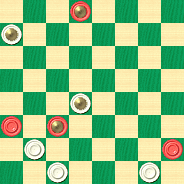
WHITE
White to Move and Win
There are several branches in the solution, and full credit is only obtained if you find them all. Are you up to this rather "grimy" challenge? Try it out, and then click on Read More when you've "come clean" and are ready to check your results.![]()
How Fast Can You See?

Our infamous clock will start the instant you click on the links below, and we're timing you right down to the millisecond. Test your visualization: how fast can you see?
Solutions can be verified by clicking Read More, though we're pretty sure you won't need much help.
![]()
The Dodger
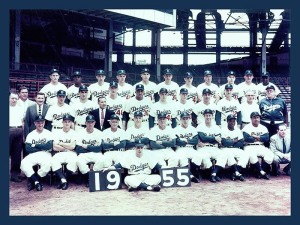
At the time that this article achieves publication, it will be near the end of the 2005 baseball season. But, since quite a few of our pieces are written well in advance, we don't know at the moment who the pennant contenders might be.
The Dodgers, of course, were in the running for many a year. We're referring, naturally, to the immortal Brooklyn Dodgers, the "Brooklyn Bums" beloved of many a checker player, including Willie Ryan and, we're certain, Tommie Wiswell.
In fact, today's feature problem is called "The Dodger" though it doesn't have any sort of baseball theme that we can readily discern. Here's the situation:
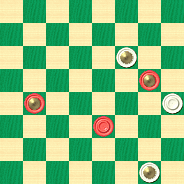
WHITE
White to Play and Win
"Dodge" erroneous play, win the pennant for White, and check your answer by clicking on Read More.![]()
The Checker Maven is produced at editorial offices in Honolulu, Hawai`i, as a completely non-commercial public service from which no profit is obtained or sought. Original material is Copyright © 2004-2025 Avi Gobbler Publishing. Other material is public domain, as attributed, or licensed under Creative Commons. Information presented on this site is offered as-is, at no cost, and bears no express or implied warranty as to accuracy or usability. You agree that you use such information entirely at your own risk. No liabilities of any kind under any legal theory whatsoever are accepted. The Checker Maven is dedicated to the memory of Mr. Bob Newell, Sr.

